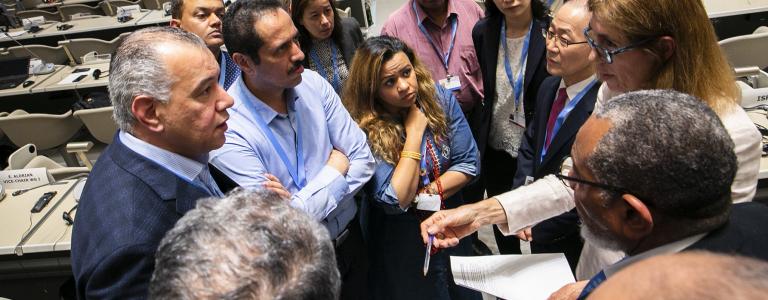Earth Negotiations Bulletin
For more than two decades, Earth Negotiations Bulletin has provided transparency and accountability to international policy-making at the United Nations.
Earth Negotiations Bulletin is a balanced, timely and independent reporting service on United Nations environment and development negotiations. Our team provides daily coverage at selected environment and development negotiations, distributing digital and print summaries of critical talks. At the conclusion of each meeting, ENB publishes an in-depth summary and analysis of the meeting.
Many UN delegates, ministers and other governmental officials, NGOs, the business community, the academic community, the media and UN staff who track environment and sustainable development policy consider the Earth Negotiations Bulletin to be essential reading. The Bulletin has received high praise for its objective and comprehensive presentation of the facts.
Visit enb.iisd.org to view coverage of global environmental negotiations extending back to 1992 or subscribe to ENB Update to receive reports, photos, and videos from negotiations around the world.
Project team

Jennifer Allan
Writer/Editor, Earth Negotiations Bulletin

Pamela Chasek
Executive Editor, Earth Negotiations Bulletin

Jennifer Covert
Lead, ENB Development

Maja Schmidt-Thomé
Lead, ENB Operations

Lynn Wagner
Senior Director, Tracking Progress

Brett Wertz
Manager, Earth Negotiations Bulletin

Jessica Templeton
Lead, Earth Negotiations Bulletin

Matthew TenBruggencate
Communications Manager
Latest
You might also be interested in
Trade and Climate Change
IISD project on trade and climate change
Budgeting for India’s Energy Transition
Research and analysis exploring India’s financial support for clean energy and fossil fuels.
Friends of Climate and Health
The Friends of Climate and Health is an informal group of countries working to foster international collaboration on climate change and health.
Normalizing No New Fossil Fuels
There is no room for new fossil fuel projects under a 1.5°C global warming limit. New research explores how countries and the public can establish “no new fossil fuels” as a benchmark for climate leadership.
